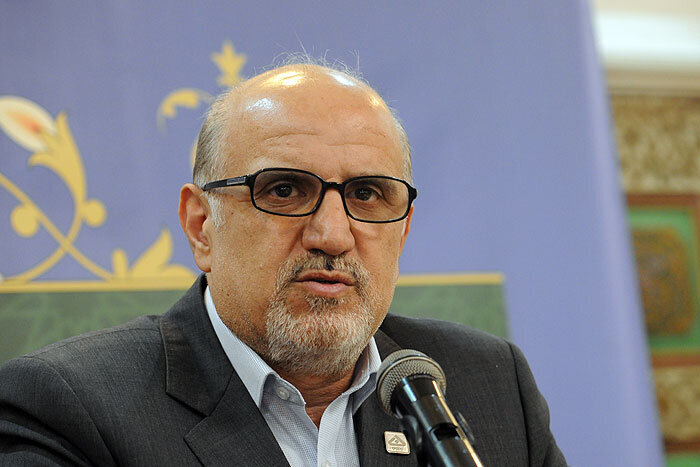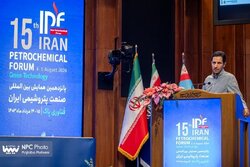
Smart petchem industry required for stable presence in global markets

Making the remarks in an interview conducted by Shana, Behzad Mohammadi reiterated, “In the petrochemical sector we should have a global view.”
He also emphasized moving in the way of attracting more investors to this industry.
The official further mentioned the production of petrochemical products in the past Iranian calendar year (ended on March 19) and said, “Last year was a successful year in terms of petrochemical production, there was no problem in this due, and the projected annual output was achieved.”
According to Mohammadi, the petrochemical industry is not like the oil industry and it is practically unsanctionable.
“For oil, the ways of selling and the costumers are specific and limited but that is not the case with petrochemicals. There are hundreds of holdings which are eager for buying our diverse petrochemical products”, Behzad Mohammadi has told the Tehran Times in a press conference on the sidelines of the 24th Iran International, Oil, Gas, Refining and Petrochemical Exhibition (Iran Oil Show 2019).
“However, we are holding meetings with our customers to explore various aspects of possible impacts of the U.S. sanctions on our trade", he added.
Projects worth $12b to be inaugurated by Mar. 2021
NPC managing director further announced that the company plans to inaugurate projects worth about $12 billion by the end of the current Iranian calendar year (March 20, 2021), which will increase the country’s annual petrochemical output to 86 million tons from the current 66 million tons.
The output of Iranian petrochemical production units in the first 50 days of the current Iranian calendar year (started on March 19) increased by six percent compared to the previous year’s same period.
According to Jalal Mirhashemi, the NPC 's production control manager, the country’s petrochemical complexes are producing with a desired capacity, and many complexes have shown production growth since the beginning of the current year.
He said that Iran's petrochemical industry is ready to realize the surge in production intended for the current year, adding that in addition to launching and operating new projects, the existing idle capacity of some complexes will also be used with the measures taken.
The petrochemical industry is one of the most important pillars and the driving force of development for various sectors of the country's economy, he stressed.
In late December 2019, President Hassan Rouhani had stressed the significant role of the petrochemical industry in the country’s economy in the face of U.S. sanctions, saying that it is at the forefront of the country’s non-oil exports.
Later in April 2020, Oil Minister Bijan Namdar Zanganeh said 17 new petrochemical plants are planned to be inaugurated across the country during the current Iranian calendar year.
The current Iranian calendar year (began on March 20) is named as the year of “Surge in Production” by the Leader of Islamic Revolution Seyed Ali Khamenei.
The petrochemical industry is playing a crucial role in Iran's non-oil economy, so that based on official data, petrochemical exports constitute the second-largest hard currency earner in Iran after crude oil. Petrochemical exports already make up nearly 33 percent of the country’s non-oil exports.
Also, as announced by the NPC’s managing director, currently over 108,000 direct employees are working in various fields of the petrochemical industry.
Technical knowledge should be elevated
During the Shana interview, Mohammadi also put emphasis on the necessity of elevating technical knowledge in the petrochemical industry, and said, “We should promote technical knowledge in a way to move toward more diversity in production and also producing products with higher value-added.”
Strengthening domestic production and indigenizing the knowledge and technology for production of the products and equipment that Iran imports from other countries has become one of the major programs that the country is pursuing in recent years.
To materialize this objective, knowledge-based companies have played a noticeable part, especially in indigenizing the products and equipment applied in the oil industry, which is the major sector in the country’s national economy.
Cooperating with capable domestic knowledge-based companies and startups is one of the very fruitful steps that the oil ministry has taken in its efforts to reach complete independence from the foreign resources for meeting its equipment needs.
To materialize the goal of indigenizing the production of the oil industry’s equipment, the country’s Petrochemical Research and Technology Company (PRTC) has also played a very significant role in collaborating with the knowledge-based companies for working on innovative research projects for producing various equipment and base-products needed in the industry.
PRTC’s Managing Director Ali Pajouhan has recently announced that the National Petrochemical Company, in collaboration with domestic companies, is planning to indigenize the knowledge for producing nine major catalysts used in the petrochemical industries within the next two years.
However, catalysts are very expensive substances and currently, the country is spending millions of dollars every year on importing such products into the country, producing such catalysts inside the country would make a huge difference in the profitability rate of the petrochemical plants.
Iranian petrochemical industry is currently using 40 different types of catalysts which cost the industry $260 million annually.
“Currently, the knowledge for producing 16 of the mentioned 40 types has been indigenized which would save the country $105 million every year.” Ali Pajouhan said, adding that “We plan to produce over $100m worth of petrochemical catalysts annually, by the end of the Iranian calendar year of 1400 (March 20, 2022).”


Trump weighs using $2 billion in CHIPS Act funding for critical minerals

Codelco cuts 2025 copper forecast after El Teniente mine collapse

Electra converts debt, launches $30M raise to jumpstart stalled cobalt refinery

Barrick’s Reko Diq in line for $410M ADB backing

Abcourt readies Sleeping Giant mill to pour first gold since 2014

Nevada army depot to serve as base for first US strategic minerals stockpile

SQM boosts lithium supply plans as prices flick higher

Viridis unveils 200Mt initial reserve for Brazil rare earth project

Tailings could meet much of US critical mineral demand – study

Kyrgyzstan kicks off underground gold mining at Kumtor

Kyrgyzstan kicks off underground gold mining at Kumtor

KoBold Metals granted lithium exploration rights in Congo

Freeport Indonesia to wrap up Gresik plant repairs by early September

Energy Fuels soars on Vulcan Elements partnership

Northern Dynasty sticks to proposal in battle to lift Pebble mine veto

Giustra-backed mining firm teams up with informal miners in Colombia

Critical Metals signs agreement to supply rare earth to US government-funded facility

China extends rare earth controls to imported material

Galan Lithium proceeds with $13M financing for Argentina project

Kyrgyzstan kicks off underground gold mining at Kumtor

Freeport Indonesia to wrap up Gresik plant repairs by early September

Energy Fuels soars on Vulcan Elements partnership

Northern Dynasty sticks to proposal in battle to lift Pebble mine veto

Giustra-backed mining firm teams up with informal miners in Colombia

Critical Metals signs agreement to supply rare earth to US government-funded facility

China extends rare earth controls to imported material

Galan Lithium proceeds with $13M financing for Argentina project

Silver price touches $39 as market weighs rate cut outlook


















